Are you a beginner bassist looking for the perfect instrument to start your musical journey? Look no further than Squier Precision Basses. Squier, a budget-friendly line under Fender, offers high-quality instruments at an affordable price point. The Precision Bass model is one of their most popular offerings and for good reason.
In this blog post, we’ll explore why Squier Precision Basses are the ideal choice for beginner bassists, including their sound quality, playability, and affordability. Whether you’re just starting out or looking to upgrade from your current instrument, read on to discover why Squier Precision Basses should be at the top of your list.
Explore Squier Precision Basses: A Brief History
The Squier Precision Bass, also known as the Squier P-Bass, is an affordable version of the Fender Precision Bass. Squier was originally a string manufacturer before being acquired by Fender in 1965. In the early 1980s, Fender began producing low-cost versions of their instruments overseas under the Squier brand.
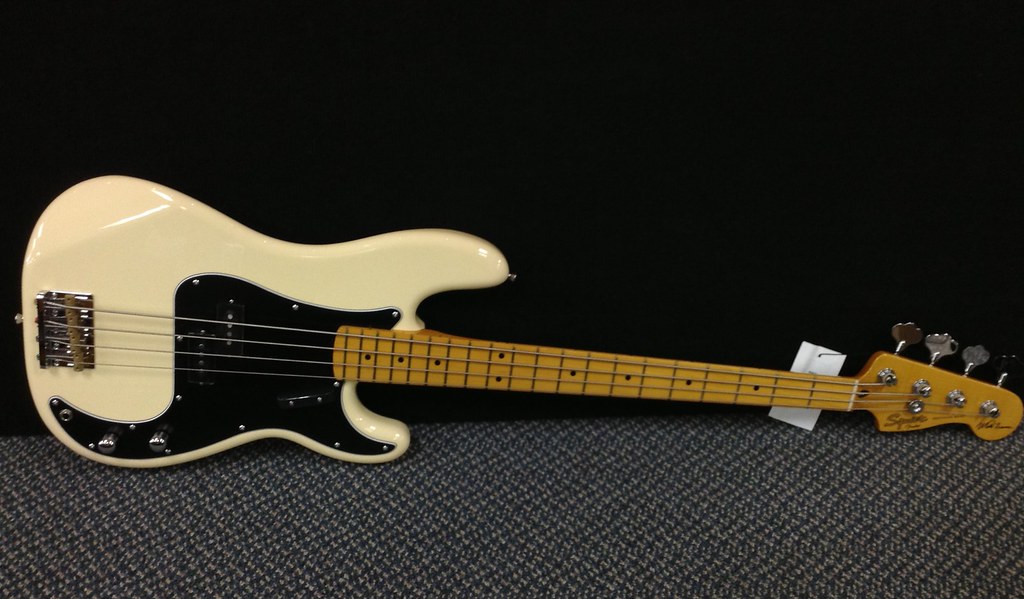
The Squier P-Bass was first introduced in 1982 and quickly gained popularity among beginner and intermediate bass players due to its affordability and solid build quality. The initial models were made in Japan and featured a similar design to the original Fender Precision Bass.
In the late 1980s, production shifted to Korea and later Indonesia, where Squier continued to produce various versions of the Precision Bass at lower price points than their American-made counterparts. Over time, new features such as jazz bass pickups and active electronics were added to certain models.
Today, the Squier Precision Bass remains a popular choice for musicians on a budget or those looking for a reliable backup instrument. It has become a staple in many genres of music including rock, funk, and punk.
Features Of Precision Model Squier Bass Guitars
The Squier Precision Bass (P-Bass) is known for its classic design and powerful sound. Here are some of the main features that make it a popular choice among musicians:
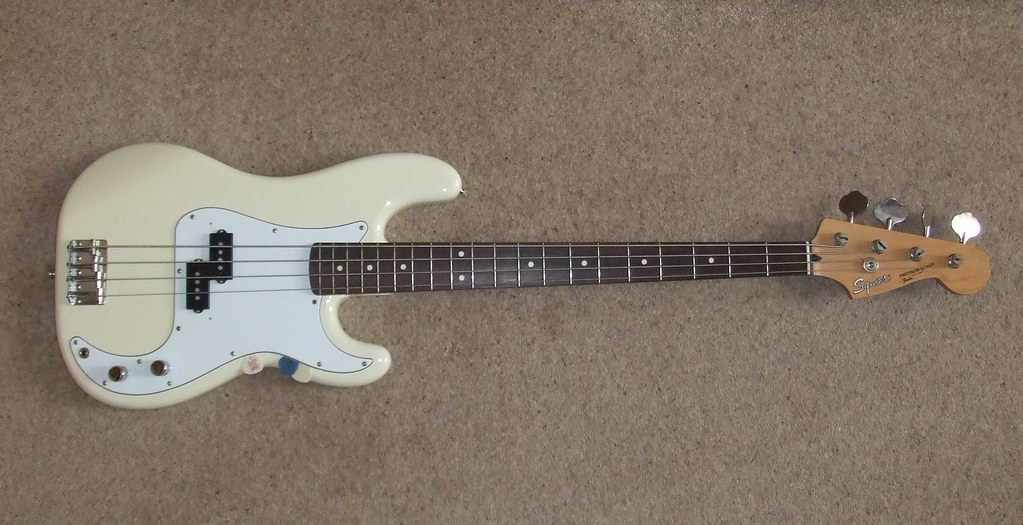
Body
The body of the Squier P-Bass is typically made of solid wood, such as alder or basswood. It has a classic double-cutaway shape with a contoured back for comfortable playing.
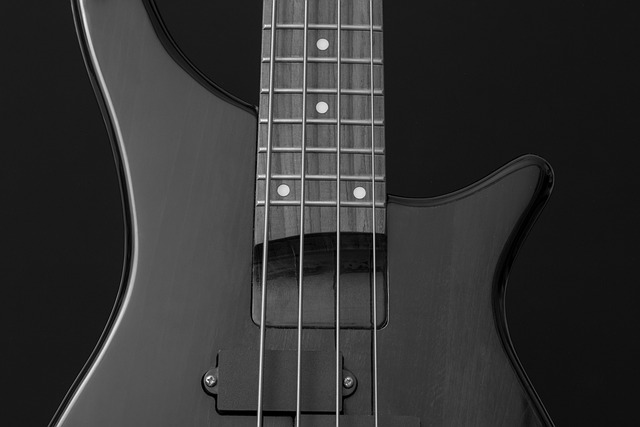
Neck
The neck is usually made of maple and features a modern “C” shape for easy playability. Some models may have a rosewood or laurel fingerboard.
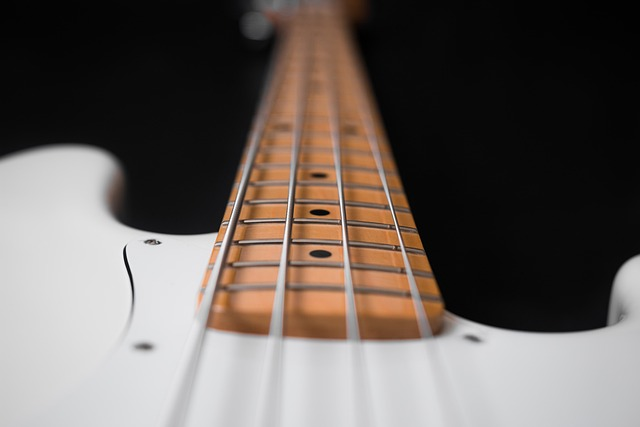
Pickups
The Squier P-Bass features a split-coil pickup in the middle position, which produces a thick and punchy tone. Some models may also have an additional jazz bass pickup in the bridge position for added versatility.
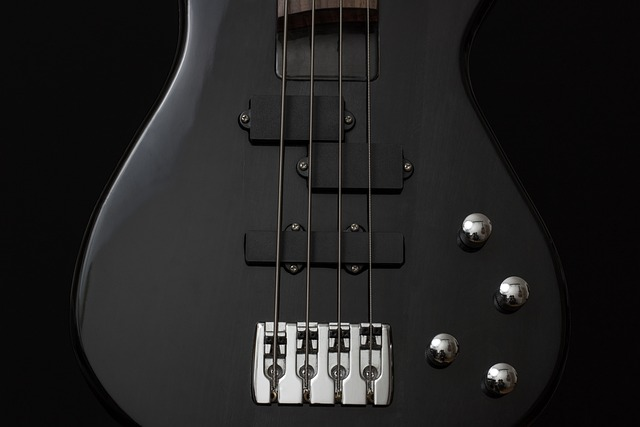
Bridge
The bridge on most Squier P-Basses is a vintage-style four-saddle design, which provides stable tuning and good intonation.
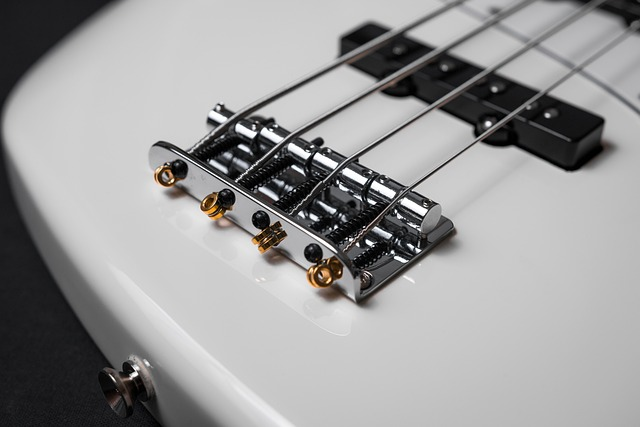
Controls
The controls on the Squier P-Bass are simple yet effective, with individual volume and tone knobs for each pickup.
Overall, the Squier Precision Bass offers a classic design and versatile sound at an affordable price point, making it an ideal choice for beginner and intermediate bass players alike.
The Top Squier P basses
The basic story has been completed where I am looking for the very best Fender Precision Squier basses available at Amazon. I’d be interested in helping people see that this base is not only the most popular P Bass from Squier but also the most affordable.
Best Squier P bass overall: Squier Classic Vibe Precision Bass ‘50s
The Squier Classic Vibe Precision Bass ’50s is a bass guitar that pays homage to the classic design of the original Precision Bass from the 1950s. Here are some of its key features:
Vintage-inspired design
The Classic Vibe Precision Bass ’50s features a sleek, vintage-inspired design with a classic sunburst finish and a single-ply gold anodized pickguard.
Alnico pickups
This bass guitar comes equipped with Fender-designed alnico split-coil pickups, which provide warm, punchy tones that are well-suited for rock, blues, and other genres.
Maple neck
The neck of the Classic Vibe Precision Bass ’50s is made from maple and has a modern “C”-shape profile that provides comfortable playability.
20-fret fingerboard
The fingerboard on this bass guitar is made from Indian laurel and features 20 medium-jumbo frets that allow for easy playability across all registers.
Vintage-style hardware
The Classic Vibe Precision Bass ’50s comes with vintage-style hardware, including open-gear tuning machines and a four-saddle bridge with threaded steel saddles.
Affordable price point
One of the main advantages of the Squier Classic Vibe Precision Bass ’50s is its affordability, making it an excellent option for beginner and intermediate players who want to experience the classic sound and feel of a vintage P-Bass without breaking the bank.
On balance, the Squier Classic Vibe Precision Bass ’50s is an excellent choice for anyone looking for a versatile bass guitar with vintage-inspired design elements and solid build quality at an affordable price point.
Why should you get a Squier P bass?
The Squier Precision Bass is a popular choice among musicians due to its classic design and powerful sound.
One of the main advantages of the Squier P-Bass is its affordability, offering a solid build quality and timeless design at a much lower price point than many other bass guitars on the market.
Despite its simplicity, the Squier P-Bass is capable of producing a wide range of tones thanks to its split-coil pickup and tone controls, making it suitable for many different styles of music including rock, funk, blues, and more.
The brand has a reputation for producing reliable instruments that are suitable for beginner and intermediate players. In addition, as your skills develop over time, you may want to upgrade certain components on your bass guitar such as pickups or bridge.
The Squier P-Bass is an excellent platform for modification due to its popularity and availability of aftermarket parts.
The Squier Precision Bass is an excellent choice for anyone looking for an affordable yet versatile bass guitar with a classic design and solid build quality.
The Top Squier P basses
Squier has several highly-rated models of Precision Bass, but some of the most popular and well-reviewed options include:
Squier Classic Vibe ’50s Precision Bass
This model is praised for its vintage-inspired design and tonal versatility, thanks to its alnico single-coil pickup.
Squier Affinity Series Precision Bass PJ
This bass features a split-coil P Bass middle pickup and a Jazz Bass bridge pickup, offering a wide range of tonal options.
Squier Contemporary Active Precision Bass HH
With its dual ceramic humbucking pickups and active preamp system, this bass delivers powerful and punchy tones that are perfect for rock and metal music.
Squier Vintage Modified Precision Bass PJ
Another versatile option, this bass combines a traditional split-coil P Bass pickup with a Jazz Bass single-coil bridge pickup to offer a wide range of tones.
Squier’s Precision Bass models are known for their affordable price points and high-quality components, making them great options for both beginners and more experienced players alike.
Squier Precision Bass vs Fender Precision Basses
Fender and Squier are two brands that are closely associated with the Precision Bass, one of the most iconic bass guitars of all time. While both Fender and Squier produce Precision Basses, there are some key differences between the two brands that are worth considering before making a purchase.
Price
One of the biggest differences between Fender and Squier Precision Basses is price. Fender instruments tend to be more expensive than Squier instruments due to their higher quality materials and craftsmanship.
Build Quality
Fender instruments are generally known for their high build quality, which is reflected in their premium price point. Squier instruments, on the other hand, tend to use less expensive materials and may have less attention paid to detail during production.
Sound Quality
While both Fender and Squier Precision Basses share some similarities in terms of tone and sound quality, many musicians believe that Fender basses have a richer sound due to their higher-quality pickups, electronics, and hardware.
Customization
Because they are more expensive and typically made with higher-quality materials, Fender Precision Basses offer more opportunities for customization than Squier models do. And many find the quality of the materials they offer to customize the bass, such as a maple fingerboard, pickup configuration on applicable models and the like, to be of a higher quality.
With this in mind, it’s easy to see why so many choose Fender to be part of their musical journey if they can afford it.
Brand Reputation
Finally, it’s worth considering the reputation of each brand when making a decision about which bass guitar to purchase. Fender has been a leader in instrument manufacturing for decades and is widely regarded as one of the best brands in the industry. Squier has a reputation for producing affordable instruments that offer solid performance at lower price points.
Ultimately, whether you choose a Fender or a Squier Precision Bass will depend on your individual needs as a musician. If you’re looking for an instrument with top-of-the-line craftsmanship and superior sound quality, a Fender may be the way to go. If you’re on a budget or just getting started with playing bass guitar, however, a Squier can offer excellent value for money without sacrificing too much in terms of performance or sound quality.
Other Accessories To Buy With Your P Bass
Whilst getting a new bass is always great, it’s rarely everything you need. There are always small accessories you need to really get the best out of your bass and these are a must. Even if you’re on a tight budget but trust us, it’s worth your willingness to pay a little extra for a much greater playing experience.
Gig bag
A gig bag is a protective case that provides safety and security for your bass guitar while traveling or transporting it to gigs and rehearsals. It offers several benefits, such as protection against scratches, dings, and other types of damage that can occur during transportation. Gig bags are also lightweight and easy to carry, making them great for musicians who need to travel frequently with their instruments.
In addition, many gig bags come with extra pockets and compartments for storing accessories like cables, picks, and tuners. Compared to hardshell cases, gig bags are often more cost-effective while still providing adequate protection for your bass guitar.
Therefore, investing in a high-quality gig bag can help prolong the life of your bass guitar by keeping it safe and secure while on the go.
Spare Strings
Having spare bass strings is a necessity for any bass player. Whether you’re a beginner or an experienced musician, there are several reasons why having spare bass strings is important. Firstly, bass guitar strings can break unexpectedly due to heavy playing, accidental damage or wear and tear over time. Having spare strings on hand means that you can quickly replace a broken string without interrupting your playing.
Secondly, changing all of your bass guitar strings at once ensures consistency in tone across all strings. It also allows you to experiment with different types of strings to find the sound that works best for you. Additionally, if you have an important gig or recording session coming up, having spare bass strings will give you peace of mind knowing that you’re prepared for any unexpected situations.
Lastly, having spare bass strings on hand means that you don’t have to run out to the music store every time a string breaks which saves you time and money in the long run. In conclusion, having spare bass guitar strings is essential for any serious musician who wants consistent sound quality and be prepared for unexpected situations while playing their instrument.
Amp
This one is simple. An electric bass isn’t an acoustic instrument so if you want to get noise from your new P bass with a fancy maple fretboard, you’ll need an amp. Plain and simple. You need to get a bass amp.
Jack Cables
Jack cables provide a connection between your bass and the amp which the signal can pass through. Without jack cables you won’t get very far!
Strap
This will help keep the bass in a comfortable and playable position when standing or sitting. Be sure to get something with a thick strap, that’s comfy and disperses the weight of the bass evenly across your shoulder.
Is Squier a good bass brand?
Yes, Squier is a good bass brand that offers affordable instruments with solid performance and quality.
While they may not have the same level of craftsmanship or attention to detail as more expensive brands like Fender, Squier basses are known for their value for money and can be an excellent choice for beginner or intermediate players.
Is jazz bass better than precision?
This is subjective and depends on personal preference and playing style. Jazz Basses are known for their versatility and offer a wider range of tonal options compared to Precision Basses. Precision Basses, on the other hand, are known for their signature thumpy sound that has become synonymous with rock music.
Ultimately, which one is better will depend on what type of music you play and your individual preferences.
Is Jazz bass lighter than Precision Bass?
On average, yes – Jazz Basses tend to be slightly lighter than Precision Basses due to their smaller body size and weight distribution.
Does jazz bass sound like precision?
While there are some similarities between the two, Jazz Basses and Precision Basses have distinct sounds that set them apart from each other. Precision Basses are known for their deep, punchy tone, while Jazz Basses offer a wider range of tonal options thanks to their dual pickups and more versatile electronics.
What’s better P or J bass?
This is subjective and depends on personal preference and playing style. Precision Basses (P-Basses) are known for their deep, punchy tone, while Jazz Basses (J-Basses) offer a wider range of tonal options thanks to their dual pickups and more versatile electronics. Ultimately, which one is better will depend on what type of music you play and your individual preferences.
Is Squier PJ bass good?
Yes, Squier PJ basses are a great choice for beginner or intermediate players looking for an affordable instrument with solid performance and quality. The combination of Precision and Jazz pickups offers a wide range of tonal options, making it a versatile choice that can handle a variety of playing styles.
Is P-Bass hard to play?
Like any instrument, learning to play the P-Bass takes time and practice – but it’s not necessarily harder than other basses. The neck on a P-Bass is typically wider than that of a J-Bass, which may take some getting used to if you’re used to playing a narrower neck.
However, many players find the thicker neck profile provides more stability and comfort when playing for extended periods.
Is P-Bass good?
Yes, the P-Bass is widely regarded as one of the most iconic bass guitars in history due to its signature thumpy sound that has become synonymous with rock music. It has been used by countless artists across multiple genres since its introduction in 1951 and continues to be popular among musicians today.
While it may not offer the same level of versatility as some other basses due to its single pickup configuration, its simplicity is part of what makes it such an enduring classic.
Is a Squier Jazz bass any good?
Yes, Squier Jazz basses are a great choice for beginner or intermediate players looking for an affordable instrument with solid performance and quality. The dual pickups and versatile electronics offer a wide range of tonal options, making it a versatile choice that can handle a variety of playing styles.
What bass do Jazz players use?
Jazz players use a variety of basses depending on their individual preferences and playing style. However, the Fender Jazz Bass is one of the most popular choices among jazz musicians due to its versatile tone and ability to cut through in ensemble settings.
Is a Squier a good bass?
Yes, Squier is a good bass brand that offers affordable instruments with solid performance and quality. While they may not have the same level of craftsmanship or attention to detail as more expensive brands like Fender, Squier basses are known for their value for money and can be an excellent choice for beginner or intermediate players.
What are P-basses good for?
P-basses (Precision Basses) are known for their deep, punchy tone that has become synonymous with rock music, motown, soul, blues and much more.
They excel at providing a strong foundation in rhythm sections due to their ability to cut through in mix without overpowering other instruments.
This makes them well-suited for genres such as rock, punk, and metal where clarity and power are essential. It also explains why they’ve been the favored instrument for many great bassists including Pino Palladino and James Jamerson.
What does the P stand for in P-Bass?
The “P” in P-Bass stands for “Precision.” The Fender Precision Bass was the first electric bass guitar to have frets, which allowed bassists to play notes with more accuracy and consistency than on previous fretless designs.
What year was the Fender Precision Bass made?
The Fender Precision Bass was introduced in 1951, making it one of the earliest electric bass guitars ever produced. It quickly gained popularity among musicians due to its innovative design and powerful sound, and it continues to be a staple of modern music today.
What is the difference between a Fender and a Squier bass?
Fender is a premium brand that produces high-quality instruments with top-notch craftsmanship and attention to detail. Squier, on the other hand, is a budget sub-brand owned by Fender that offers more affordable versions of their popular designs.
While both brands use similar materials and designs, Squier instruments are generally made with less expensive parts and may have slightly lower build quality compared to their Fender counterparts.
Which is better jazz bass or precision?
This is subjective and depends on personal preference and playing style. Jazz Basses (J-Basses) are known for their versatility thanks to their dual pickups and more complex electronics, while Precision Basses (P-Basses) offer a simpler single-pickup design that provides deep, punchy tone.
Ultimately, which one is better will depend on what type of music you play and your individual preferences.
Is a Fender Squier a good bass guitar?
Yes, Fender Squier bass guitars are generally considered to be good instruments for beginner or intermediate players. While they may not have the same level of craftsmanship or attention to detail as more expensive models, they offer solid performance and quality at an affordable price point.
Why are Fender Jazz basses so good?
Fender Jazz Basses are highly regarded by musicians due to their versatility and ability to produce a wide range of tones. The dual pickup design allows for greater tonal flexibility compared to other basses, while the slim neck profile and comfortable body shape make them easy and enjoyable to play.
What pickups are in Squier Jazz Bass?
Squier Jazz Basses typically come with single-coil pickups, although some models may feature humbucking pickups or a combination of both. These pickups offer a bright and clear sound that is well-suited for many different styles of music.
What is a Model P bass guitar?
The “P” in “Model P” stands for “Precision,” which refers to the Fender Precision Bass guitar. This was the first electric bass guitar ever produced with frets, which allowed bassists to play notes with more accuracy and consistency than on previous fretless designs.
The Precision Bass quickly became popular among musicians due to its innovative design and powerful sound, and it continues to be a staple of modern music today.
What year was the Fender Precision bass made?
The Fender Precision Bass was first introduced in 1951, making it one of the earliest electric bass guitars ever produced. It quickly became popular among musicians and helped to revolutionize modern music by providing a powerful and versatile low-end sound.
What scale is a Squier P-Bass?
Most Squier P-Bass models have a scale length of 34 inches, which is standard for most full-size bass guitars. This scale length allows for comfortable playing and accurate intonation across all frets, while also providing a rich and full tone that is well-suited for many different styles of music.






Leave a Reply